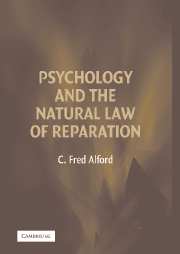4 - Making Reparation Moral
Published online by Cambridge University Press: 24 July 2009
Summary
The contemporary connotations of the term “pity” could be misleading. The phrase “I pity you” is today often little more than an insult. Nevertheless, I will use the English translation, rather than the more elegant Latin original (misericordia) precisely in order to avoid the elegance of a Latin term, at least for English readers. For Aquinas, pity is not just a sloppy sentiment. Pity may be cultivated in the same way that all the other virtues are cultivated, by living in a community that teaches and practices them (ST II–II, 30, 3). The transformation of pity into a virtue marks a subtle but profound difference between Aquinas' Summa Theologica and Aristotle's Ethics. About the virtues of everyday life, one expects these two authors to reach similar conclusions. Certainly this is Veatch's position (2005). However, if one looks closely one finds a delicate but radical difference between them.
Pity is grief or sorrow over someone else's distress, says Aquinas, precisely insofar as one understands the other's distress as virtually identical to one's own. “Among the virtues that relate us to our neighbor misericordia is the greatest” (ST II–II, 30, 4). Particularly significant is what it takes to feel pity. Not just noblesse oblige or mercy, but that another's suffering could be one's own because one is a vulnerable human living among other humans who are similarly vulnerable.
- Type
- Chapter
- Information
- Psychology and the Natural Law of Reparation , pp. 105 - 152Publisher: Cambridge University PressPrint publication year: 2006

